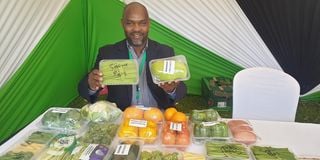Premium
Horticulture earnings drop to 24-month low

Fresh Produce Exporters Association of Kenya CEO Hosea Machuki displays some horticultural products during a conference at Safari Park Hotel.
Kenya’s earnings from flowers, fruits, and vegetable exports fell to the highest level in more than two years in September driven by a weaker Euro and Sterling pound.
Data from the Central Bank of Kenya (CBK) shows horticulture export earnings dropped five per cent to Sh8.8 billion down from Sh9.3 billion in August.
It is the lowest returns from exports of the three commodities since September 2020 when Kenya earned Sh8.5 billion from horticulture exports.
This is the fourth consecutive monthly drop in earnings from fruits, vegetables, and flowers exports, and comes despite an increase in the quantity of the exports.
As the earnings dropped 5 per cent, the quantity exported went up by 5.5 per cent to 41,592 tonnes up from 39,406 tonnes in August.
Earnings from fruits exports went down to Sh3.2 billion from Sh3.6 billion as the quantity of exported fruits dropped to 15,489 tonnes down from 16,173 tonnes.
Meanwhile, the quantity of exported cut flowers grew to 8,881 tonnes from 8,618 tonnes with earnings growing to Sh3.7 billion up from Sh3.5 billion.
The most affected export was fresh vegetables whose exported quantity increased to 17,222 tonnes from 14,616 tonnes but whose earnings fell to Sh1.9 billion down from Sh2.1 billion.
The drop was largely driven by a sharp fall in the value of the Sterling Pound and the Euro against the Kenyan shilling hurting the earnings of exporters.
Steady rise
The value of the two currencies has however started to rise steadily handing a boost to exporters who will earn more from their exports to the European market.
Demand for fresh vegetables has been rising in recent years amid the growing clamour for organic foods which has helped push Kenyan vegetables to the global market supplementing traditional exports such as coffee, tea, and flowers.
Kenyan fresh vegetable exports include tomatoes, onions, carrots, French beans, cauliflowers, and fresh peas.
Most of the cut flowers, fruits, and vegetables are exported to the UK and European Union (EU) countries such as the Netherlands, Germany, and France.
The government is however eyeing more markets such as Far East Asia and the Arabian Gulf to cut reliance on the European market.
The drop in earnings from horticulture exports is a blow to the government which relies on export earnings for foreign exchange at a time Kenya’s trade deficit is rapidly growing creating higher demand for foreign currency.
Diaspora remittances, tourism, foreign loans, and exports are Kenya’s main sources of foreign exchange.





